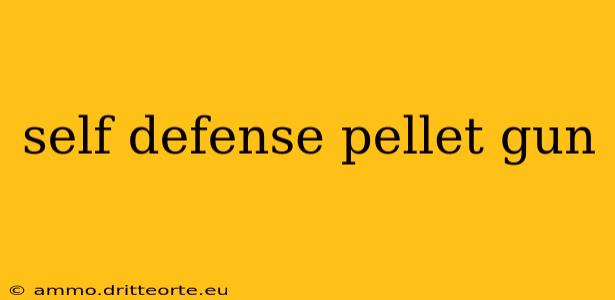Choosing a self-defense tool is a serious decision, demanding careful consideration of legality, effectiveness, and personal responsibility. Pellet guns, while less lethal than firearms, offer a potential option for home defense or personal protection in specific situations. This guide explores the key aspects of using pellet guns for self-defense, emphasizing responsible ownership and the limitations of this type of weapon.
Understanding Pellet Guns and Their Capabilities
Pellet guns, also known as air guns, use compressed air or gas to propel small metal or plastic projectiles. They vary significantly in power, accuracy, and range. While some are designed for recreational shooting, others possess sufficient power to cause serious injury at close range. It's crucial to understand the specific capabilities of any model before considering it for self-defense.
Key Considerations:
- Caliber and Power: The caliber (size of the pellet) and muzzle velocity directly impact the gun's power and range. Higher calibers and velocities generally mean greater stopping power, but also increased risk of serious injury.
- Accuracy and Range: Effective self-defense necessitates accuracy. A pellet gun's effective range is significantly less than a firearm; you need to be within a relatively short distance to hit your target.
- Legality: Laws regarding pellet gun ownership and use vary widely by location. Some jurisdictions have restrictions on power, use, and even possession. Before purchasing any pellet gun, research your local laws thoroughly. Ignoring these laws can lead to serious legal consequences.
- Ammunition: Different pellet types (lead, copper, plastic) behave differently. Understanding how your chosen ammunition performs is essential for safe and effective use.
The Limitations of Pellet Guns for Self-Defense
While pellet guns can deter potential attackers and potentially cause injury, they are significantly less effective than firearms in self-defense scenarios. Several key limitations must be considered:
- Limited Stopping Power: Pellet guns lack the stopping power of firearms. They may not immediately incapacitate an attacker, particularly one under the influence of drugs or alcohol.
- Dependence on Accurate Shots: Missing your target renders a pellet gun useless. Even a well-placed shot may not stop a determined assailant.
- Legal Ramifications: Even in self-defense, using a pellet gun can lead to legal complications. Proving justifiable use of force is critical, and the burden of proof often falls on the individual.
- Ethical Considerations: The potential for serious injury, even with a less-lethal weapon, raises ethical concerns. Using a pellet gun for self-defense requires a clear understanding of potential consequences.
Responsible Ownership and Use
If you decide to use a pellet gun for self-defense, responsible ownership is paramount:
- Training and Practice: Regular practice is crucial to develop accuracy and proficiency. Familiarize yourself with your weapon's mechanics and limitations.
- Safe Storage: Store your pellet gun securely, out of reach of children and unauthorized individuals.
- Legal Compliance: Always comply with all applicable laws and regulations concerning pellet gun ownership and use.
- Situational Awareness: Develop good situational awareness to avoid potentially dangerous situations in the first place.
Alternatives to Pellet Guns for Self-Defense
Consider exploring other self-defense options, such as:
- Self-defense classes: Learning practical self-defense techniques can significantly improve your ability to protect yourself without weapons.
- Personal alarms: Loud personal alarms can deter attackers and attract attention.
- Pepper spray: A non-lethal option that can temporarily incapacitate an attacker.
Conclusion: Weighing the Risks and Benefits
Pellet guns can offer a level of self-defense, but their limitations must be acknowledged. Their effectiveness depends heavily on accurate shots at close range, and their use can have legal consequences. Thoroughly research your local laws, consider alternatives, and prioritize responsible ownership and training if you choose to use a pellet gun for self-defense. Remember, your safety and the safety of others should always be your primary concern.

